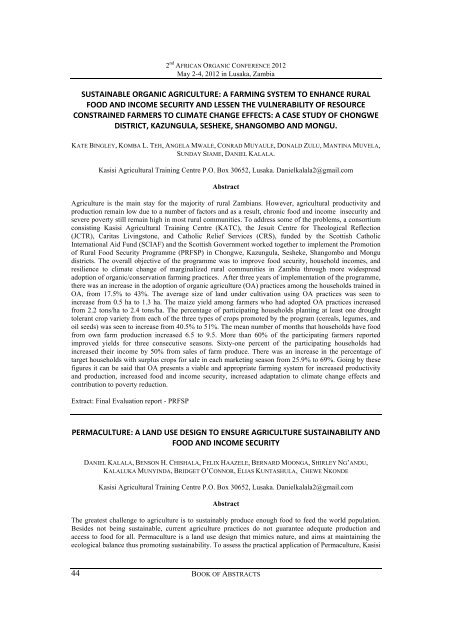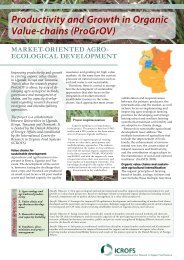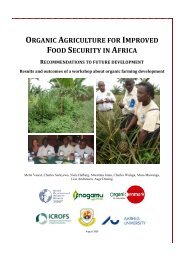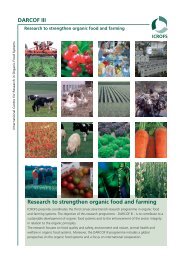The 2nd African Organic Conference â Mainstreaming ... - ICROFS
The 2nd African Organic Conference â Mainstreaming ... - ICROFS
The 2nd African Organic Conference â Mainstreaming ... - ICROFS
Create successful ePaper yourself
Turn your PDF publications into a flip-book with our unique Google optimized e-Paper software.
2 nd AFRICAN ORGANIC CONFERENCE 2012<br />
May 2-4, 2012 in Lusaka, Zambia<br />
SUSTAINABLE&ORGANIC&AGRICULTURE:&A&FARMING&SYSTEM&TO&ENHANCE&RURAL&<br />
FOOD&AND&INCOME&SECURITY&AND&LESSEN&THE&VULNERABILITY&OF&RESOURCE&<br />
CONSTRAINED&FARMERS&TO&CLIMATE&CHANGE&EFFECTS:&A&CASE&STUDY&OF&CHONGWE&<br />
DISTRICT,&KAZUNGULA,&SESHEKE,&SHANGOMBO&AND&MONGU.&<br />
&<br />
KATE BINGLEY, KOMBA L. TEH, ANGELA MWALE, CONRAD MUYAULE, DONALD ZULU, MANTINA MUVELA,<br />
SUNDAY SIAME, DANIEL KALALA.<br />
Kasisi Agricultural Training Centre P.O. Box 30652, Lusaka. Danielkalala2@gmail.com<br />
Abstract<br />
Agriculture is the main stay for the majority of rural Zambians. However, agricultural productivity and<br />
production remain low due to a number of factors and as a result, chronic food and income insecurity and<br />
severe poverty still remain high in most rural communities. To address some of the problems, a consortium<br />
consisting Kasisi Agricultural Training Centre (KATC), the Jesuit Centre for <strong>The</strong>ological Reflection<br />
(JCTR), Caritas Livingstone, and Catholic Relief Services (CRS), funded by the Scottish Catholic<br />
International Aid Fund (SCIAF) and the Scottish Government worked together to implement the Promotion<br />
of Rural Food Security Programme (PRFSP) in Chongwe, Kazungula, Sesheke, Shangombo and Mongu<br />
districts. <strong>The</strong> overall objective of the programme was to improve food security, household incomes, and<br />
resilience to climate change of marginalized rural communities in Zambia through more widespread<br />
adoption of organic/conservation farming practices. After three years of implementation of the programme,<br />
there was an increase in the adoption of organic agriculture (OA) practices among the households trained in<br />
OA, from 17.5% to 43%. <strong>The</strong> average size of land under cultivation using OA practices was seen to<br />
increase from 0.5 ha to 1.3 ha. <strong>The</strong> maize yield among farmers who had adopted OA practices increased<br />
from 2.2 tons/ha to 2.4 tons/ha. <strong>The</strong> percentage of participating households planting at least one drought<br />
tolerant crop variety from each of the three types of crops promoted by the program (cereals, legumes, and<br />
oil seeds) was seen to increase from 40.5% to 51%. <strong>The</strong> mean number of months that households have food<br />
from own farm production increased 6.5 to 9.5. More than 60% of the participating farmers reported<br />
improved yields for three consecutive seasons. Sixty-one percent of the participating households had<br />
increased their income by 50% from sales of farm produce. <strong>The</strong>re was an increase in the percentage of<br />
target households with surplus crops for sale in each marketing season from 25.9% to 69%. Going by these<br />
figures it can be said that OA presents a viable and appropriate farming system for increased productivity<br />
and production, increased food and income security, increased adaptation to climate change effects and<br />
contribution to poverty reduction.<br />
Extract: Final Evaluation report - PRFSP<br />
PERMACULTURE:&A&LAND&USE&DESIGN&TO&ENSURE&AGRICULTURE&SUSTAINABILITY&AND&<br />
FOOD&AND&INCOME&SECURITY&<br />
&<br />
DANIEL KALALA, BENSON H. CHISHALA, FELIX HAAZELE, BERNARD MOONGA, SHIRLEY NG’ANDU,<br />
KALALUKA MUNYINDA, BRIDGET O’CONNOR, ELIAS KUNTASHULA, CHEWE NKONDE<br />
Kasisi Agricultural Training Centre P.O. Box 30652, Lusaka. Danielkalala2@gmail.com<br />
Abstract<br />
<strong>The</strong> greatest challenge to agriculture is to sustainably produce enough food to feed the world population.<br />
Besides not being sustainable, current agriculture practices do not guarantee adequate production and<br />
access to food for all. Permaculture is a land use design that mimics nature, and aims at maintaining the<br />
ecological balance thus promoting sustainability. To assess the practical application of Permaculture, Kasisi<br />
44<br />
BOOK OF ABSTRACTS





